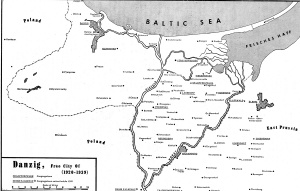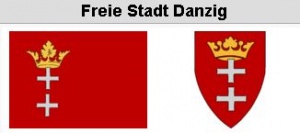Danzig, Free City of
Danzig was first under the Teutonic Order, until 1454, when it voluntarily came under the protectorate of Poland, from 1454 until 1772. It joined the Hanseatic League in 1391, and under the Polish regime was to all intents an independent free city. In 1772 (fully only in 1793) it became Prussian, remaining so until 1920.
The Treaty of Versailles (effective 20 January 1920) placed the city of Danzig and its immediate vicinity (ca. 790 square miles) under the protection of the League of Nations as an independent state (Free City of Danzig [German, Freie Stadt Danzig; Polish, Wolne Miasto Gdańsk]), in an attempt to solve the conflict between the principle of self-determination (the city was German) and the need of Poland for a free port of access to the Baltic. From 7 November 1920, the city had its own government with an elected senate of 21 senators and a president. It contained besides the city proper also the rural township of Danzig Heights, Danzig Lowland and Elbing, the townships Neustadt and Marienburg and the towns of Zoppot (pop. 15,000), Tiegenhof (3,000), and Neuteich (2,400). The total urban population was 225,000, the rural population 125,000. Of these, 220,000 were Protestants, 120,000 Catholics, 6,000 Mennonites, and 4,000 Jews.
Of the 120 delegates in the Volkstag in 1920, three were Mennonites. The constitution gave the Mennonites equal rights with other citizens, and in addition permitted them to substitute an affirmation for an oath. The Mennonites in the Free City belonged to the following congregations: Danzig, Fürstenwerder with its subsidiary Neunhuben, Ladekopp-Orlofferfelde, Tiegenhagen, Rosenort, and Heubuden. Heubuden was divided, only that part lying west of the Nogat belonging to the Free City.
The history of the territory was a turbulent one after the accession of Adolf Hitler to power in 1933. In 1934 Hitler arbitrarily denounced the German-Polish nonaggression treaty, and demanded the return of Danzig to Germany, which naturally was refused. After that time, the Nazi party agitated and terrorized the population until by 1937 the Gestapo was in complete control of the city. Even a terrorized election of 1935 failed to secure the necessary two-thirds majority for the Nazis (they received only 57.3 percent). In August 1939, by a coup d'etat, Forster declared himself head of the state, and shortly thereafter Hitler reincorporated Danzig into the Reich. The war with Poland was occasioned by this act, and was followed by World War II.
After the war, the Danzig was incorporated into Poland and renamed Gdańsk.
Bibliography
Hege, Christian and Christian Neff. Mennonitisches Lexikon, 4 vols. Frankfurt & Weierhof: Hege; Karlsruhe: Schneider, 1913-1967: v. I, 390.
| Author(s) | H. G. Mannhardt |
|---|---|
| Harold S. Bender | |
| Date Published | 1956 |
Cite This Article
MLA style
Mannhardt, H. G. and Harold S. Bender. "Danzig, Free City of." Global Anabaptist Mennonite Encyclopedia Online. 1956. Web. 2 Feb 2026. https://gameo.org/index.php?title=Danzig,_Free_City_of&oldid=122888.
APA style
Mannhardt, H. G. and Harold S. Bender. (1956). Danzig, Free City of. Global Anabaptist Mennonite Encyclopedia Online. Retrieved 2 February 2026, from https://gameo.org/index.php?title=Danzig,_Free_City_of&oldid=122888.
Adapted by permission of Herald Press, Harrisonburg, Virginia, from Mennonite Encyclopedia, Vol. 2, pp. 7-9. All rights reserved.
©1996-2026 by the Global Anabaptist Mennonite Encyclopedia Online. All rights reserved.


